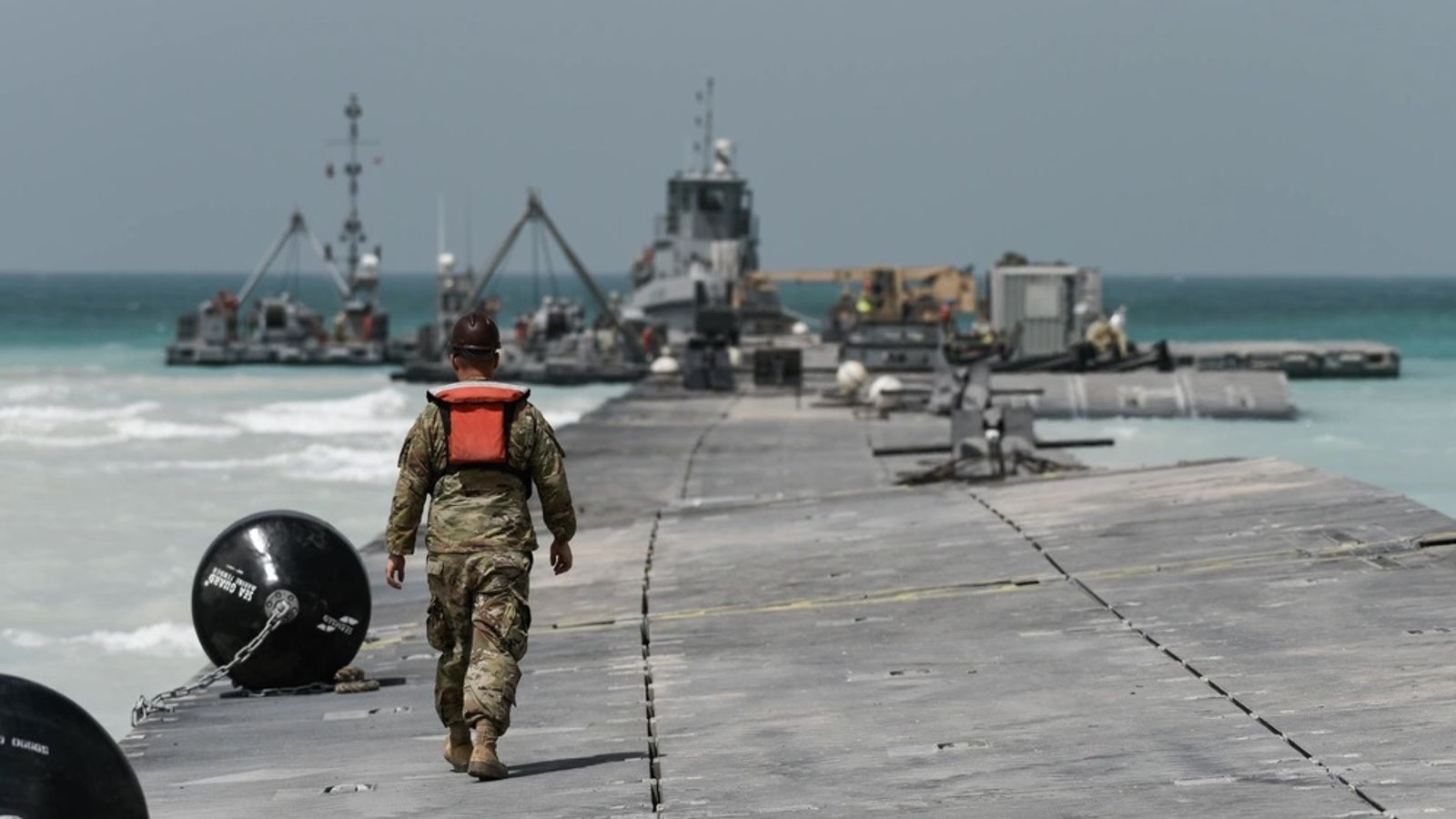Gaza’s population, displaced and devastated by Israel’s continuing offensive against the narrow strip, is on the brink of famine.
International efforts to get aid in have faced challenges, so much so that President Joe Biden announced on Thursday night that the US would build a temporary port on Gaza’s coast.
Follow latest: Aid ship ‘heading to Gaza today’
The president insisted there would be “no US boots on the ground” but there has been little detail so far on how the ambitious project will work.
Sky News spoke to some experts to try and answer some of the key questions about the proposed temporary port, from how long it will take to set up, to how it can be run without US soldiers on the shoreline.
What is a temporary dock and why does Gaza need one?
A temporary or floating dock is used to allow boats and ships to moor up further away from the shore – generally so they can stay in deep enough water.
They’ve been used various times throughout history. Perhaps the most famous example were the floating mulberry harbours that Allied forces used during the D-Day landings.
Gaza does not have a deep water port, hence the discussion of a temporary dock.
Professor Michael Clarke, a military analyst, told Sky News that both the US and the UK have ships that can deliver aid directly to the beaches.
But he added: “If you’re going to get tonnages in – which is what they need to do, the equivalent of 500 trucks a day – then you’ve got to have proper unloading facilities.”
How long will it take and who will be involved?
Getting a temporary dock on Gaza’s coast built, set up and in operation won’t happen overnight, according to Sky News’ Middle East correspondent Alistair Bunkall.
“It will take many weeks at least,” he said. “And it comes with all sorts of other questions.”
He pointed out that President Biden said the US military would lead the effort, suggesting others would be involved.
Shipments are expected to come via Cyprus enabled by the US military and a coalition of partners and allies, Sky News’ partner network NBC News is reporting, citing US officials.
What happens in the meantime?
Assuming that the project gets off the ground and can be made to work, there will still be a gap between that time and now.
Meanwhile, there is no easy answer on getting humanitarian aid into Gaza.
“This is an indication of a clear failure by the US administration in terms of its foreign policy,” says Baraa Shiban, associate fellow at the Royal United Services Institute thinktank.
He pointed to humanitarian aid stacked up at the Rafah crossing in southern Gaza, that can’t get in, as evidence the Biden administration is failing to persuade Egypt and Israel to let enough aid through.
An Israeli government spokesperson told Sky News they welcomed their “allies’ support in getting more aid to the people that need it” and insisted there were “no limits on the amount of aid that can go into Gaza”.
Some aid is being dropped into the territory from above, but such are the acute shortages that children have begun to die of starvation.
World health authorities are conducting a famine review to assess whether one should be officially declared.
What about security at the new temporary dock?
There’s also the issue that any temporary or floating dock would be operating in a war zone.
It raises the question of who would staff the facility on the shore – and how it would be kept secure.
It’s possible that United Nations Relief and Works Agency (UNRWA) could help run the operation, though nothing is clear at the moment.
Military analyst Sean Bell said it was unclear how the security environment would be controlled.
“Because the need is so urgent now, that will create a real need for boots on the ground, which is something the West doesn’t want to do,” he told Sky News.
Professor Clarke said there would be a risk that Hamas militants, or members of the Palestinian Islamic Jihad group, could be tempted to fire at American ships offshore, creating additional risk.
Please use Chrome browser for a more accessible video player
What else is happening with aid to Gaza?
Meanwhile, the European Commission, Cyprus, the UAE, the UK and the US announced today they are setting up a maritime corridor to deliver humanitarian assistance to Gaza.
European Commission President Ursula von der Leyen said a ship carrying aid will head to Gaza today.
Belonging to Spain’s Open Arms charity, the ship will make a pilot voyage to test the maritime corridor.






















